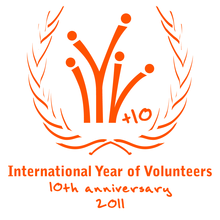
Today, on 5th December 2011, people all over the world will be celebrating the International Voluteer Day. This special day is a very important time to promote volunteering, recognize its beneficial effects on the economy and on improving the quality of life, but more importantly to remember all of the generous volunteers throughout the world.
This year's day is especially important as it marks the 10th Anniversary since the International Year of Volunteers in 2001 and will also be marked by the launch of the first report prepared by UNV on the state of the World's Volunteerism.
Volunteering in numbers
In the past, in collarboration with the International Labour Organization (ILO), the United Nations Volunteers (UNV) programme, and an international Technical Experts Group (TEG), the Johns Hopkins University Center for Civil Society Studies (CCSS) developed the first-over internationally sancioned approach for gathering official data on the amount, character, and value of volunteering. In march 2011, the ILO released the final working draft ot the ILO Manual o the Measurement of Volunteer Work.
Some statistics from this study reveal the huge impact that volunteers have on the economy :
• Approximately 140 million peple in the 37 countries engage in volunteer work in a typical years.
• If those 140 million volunteers comprised the population of a country, it would be the 8th largest country in the world.
• Those 140 million volunteers representthe equivalent of 20.8 million full-time equivalent jobs.
• Volunteers make a €270 million contribution to the global economy; that would be make it the 7th largest economy in Europe.
• Volunteer input represents 68 percent of total private philanthropy in the countries studied.
• Volunteers represent 44 percent of the nonprofit workforce in those countries.
However, as many volunteers would probably confirm, the economy asepect of their work is not the motivation behind their contribution. Volunteers do it for altruistic reasons, to improve the quality of life of others and for the betterment of society in general.
Volunteers : Making things possible
Volunteers operate in all kinds of organizations and in many cases, contributiong to making things possible. Scouting is only one of the many Organizations in which Volunteers take part. For instance, Ms Flavia Pansieri, the Executive Coordinator of the UNV, explains; "I strongly believe that many UN operations would not be possible without the contributions of volunteers. We see it, in peace-keeping missions, humanitarian response and assistance to refugees, in programs that have to have a broad outreach to far away communities to promote development."
Luc Panissod, Secretary General of the World Organization of the Scout Movement, also strongly recognizes the impact that volunteers have on Scouting's mission: "Volunteering has always been at the core of the Scout Movement since its inception over a century ago. This has been reflected in our constantly improving system to train, support and reward volunteers over the years,, from local to global lebvels of the Movement. Even today, WOSM is one of the very few organizations working with children and youth, which is almost entirely driven by volunteer contributions and efforts."
The main aim of the parliamentary network of the World Scout Parliamentary Union, is to support, at national and international levels, the various aspects of WOSM activities. As Scouting, strongly depends on these volunteering efforts, part of WSPU's efforts are the promotion and development of legislation enabling and promoting volunteering.
Legislation : an important factor making volunteering possible
Th legislative aspect of volunteering is an often overlooked area, eve though it is an essntial one. Without proper legislation, many activities, projects, organizations, involving volunteers, would not be able to take place or function. For instance, "A Comparative Look at National Volunteerism Lgislation" by Taryn Neison, citing the John Hopkins University report reveals that: "The study dispels the myth that institutinal support prevents citizens from the spontaneous types of volunteer activities. In fact, the study supports state involvement to build a formal organizational base for lead to over-regulation, which presents cumbersome bureaucracy. Similarly, too many formal barriers to volunteering can prevent citizens from participating."
Intergenerational volunteers
The Secretary General of WOSM, Mr. Panissod also pointed that Scouting is one of the Organizations at the forefront of involving of all ages, young and old, in their communities :
"Today WOSM aims to be first global intergenerational organization, where milions of our voulunteers are in fact young adults some of whom are serving the Scout Movement as volunteers, but an incredible number ot them are working directly with their communicaties and are serving them on a daily basis. These young adults are having a substantial impact in the daily life of people belonging to those communitie. We need to continue and improve this aspect of our Movement which we call Rover Scouting. We also need to tell more people about such success stories."
